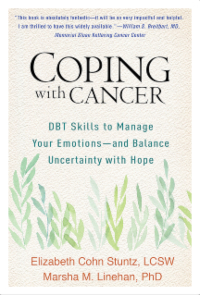Review by KrisAnn Talarico, LCSW, OSW-C
Coping with Cancer
DBT Skills to Manage Your Emotions—and Balance Uncertainty with Hope
By Elizabeth Cohn Stuntz and Marsha M. Linehan
1st edition (February 5, 2021)
Publisher : The Guilford Press
ISBN-13 : 978-1462542024
 In Coping with Cancer: DBT Skills to Manage Your Emotions – and Balance Uncertainty with Hope, Elizabeth Cohn Stuntz and Dr. Marsha Linehan outline how Dialectical Behavior Therapy (DBT) skills can be used to cope with cancer regardless of the stage or phase of one’s disease. Elizabeth Cohn Stuntz, a social worker and psychoanalyst who has worked extensively with cancer patients, speaks both from her professional experience as well as her personal experience as a cancer survivor. Her co-author, Dr. Marsha Linehan, originally developed Dialectical Behavior Therapy (DBT) in the 1980s as an intervention for severely suicidal populations. DBT is an emotion-focused therapy that teaches skills to help patients find a sense of balance in their cognitions and competence in managing their emotions. In this exceptionally well-written book, this expert duo conveys compassion, empathy and encouragement as they walk the reader through a host of different behavioral and introspective coping techniques. It reads like a step-by-step guide to the phases of coming to terms with a cancer diagnosis and feeling effective in negotiating one’s own needs. While DBT may be intimidating for some psycho-oncology clinicians because of the level of certification involved as well as the skills groups and supports inherent in formal DBT Programs, this book makes DBT approachable for clinicians and cancer patients alike.
In Coping with Cancer: DBT Skills to Manage Your Emotions – and Balance Uncertainty with Hope, Elizabeth Cohn Stuntz and Dr. Marsha Linehan outline how Dialectical Behavior Therapy (DBT) skills can be used to cope with cancer regardless of the stage or phase of one’s disease. Elizabeth Cohn Stuntz, a social worker and psychoanalyst who has worked extensively with cancer patients, speaks both from her professional experience as well as her personal experience as a cancer survivor. Her co-author, Dr. Marsha Linehan, originally developed Dialectical Behavior Therapy (DBT) in the 1980s as an intervention for severely suicidal populations. DBT is an emotion-focused therapy that teaches skills to help patients find a sense of balance in their cognitions and competence in managing their emotions. In this exceptionally well-written book, this expert duo conveys compassion, empathy and encouragement as they walk the reader through a host of different behavioral and introspective coping techniques. It reads like a step-by-step guide to the phases of coming to terms with a cancer diagnosis and feeling effective in negotiating one’s own needs. While DBT may be intimidating for some psycho-oncology clinicians because of the level of certification involved as well as the skills groups and supports inherent in formal DBT Programs, this book makes DBT approachable for clinicians and cancer patients alike.
Coping with Cancer begins with three heavy-hitting chapters that focus on what people may be facing early on in a cancer diagnosis, including Dealing with the News That You Have Cancer, How to Make Effective Decisions, and How to Manage Strong Emotions. While the simple language and descriptive patient examples are wonderfully useful and on-point, what really makes these chapters stand out are the dialectical strategies themselves and the authentic ways in which they are brought to life. According to Cohn Stuntz & Linehan, “Dialectics makes it clear that it is possible to think, feel or act in more than just one way.” (3) Early on in the book they invite the reader to consider seemingly opposing ideas with prompts like,
- “Is it possible to acknowledge feeling sad without being overwhelmed by emotion?” (1)
- “How can you let others know what you want and need when you feel too vulnerable to ask?” (1)
- “Do you think that you are powerless because you can’t totally control everything that is happening in your life?” (page 3)
As they set this stage, they also introduce strategies such as Wise Mind, Name It To Tame It and Mindfulness in easy-to-understand terms, both in how to use the skill, but also the benefit that is likely to be gained by using the skills. Within these chapters they offer authentic automatic thoughts, step-by-step instructions and patient examples that give context to how the strategies can be employed in specific situations. The text flows easily, and the skills are presented simply and methodically.
From there the book dives deeper into specific emotions likely to be encountered when coping with cancer: Managing Fear, Anxiety and Stress; Managing Sadness; and Managing Anger. Each chapter follows a nicely familiar pattern, first normalizing the emotion, naming the feeling and its associated thoughts, and then introducing specific skills to see if one can bring in a more balanced view. What is distinctive about the DBT approach is the emphasis on finding and naming the multiple, seemingly opposite realities that can exist at the same time. Whereas CBT might seek to help a patient reframe unhelpful thoughts, the subtle difference in the self-talk descriptions in this book includes an acknowledgement of both the hardship and the hope. For example,
- “I can cope even though I worry that I can’t.” (page 70)
- “Dealing with pain and distress is hard and I am trying to learn the best ways for me to cope.” (page 89)
- “It is possible to be frightened and have hope.” (3)
Reading through the self-talk examples throughout the book, the undercurrent felt like an acknowledgement of the pain of the cancer experience while also holding hope and intention.
The final chapters of the book focus on relationships, communication with colleagues and medical professionals, and living meaningfully. In these chapters, the authors were both bold and compassionate. For example, while promoting supportive connections with loved ones, the authors invite the reader to consider whether they might be holding back within close relationships. “At this time, wittingly or unwittingly, you may be the one who is keeping a distance. Recall that when people feel vulnerable they can move into protective mode.” (page 92) And, true to their balanced approach, the authors acknowledge that at times this can be a wise decision while at other times it may be more of a reaction without full information. The tools and skills involved in these chapters are introspective and practical. Chapter 8 on Communicating with Colleagues and Medical Professionals may be especially helpful for patients still building or rebuilding trust with their oncology or palliative care teams.
This book is recommended reading for cancer patients and clinicians alike, with warmth and encouragement that exude from the pages:
- “It is possible to feel helpless that you can’t control everything that is happening and recognize that there are changes you can make” (3)
- “It is possible that even if you doubt yourself or feel very vulnerable right now, you may also be more capable of coping than you ever imagined.” (127)
- “It’s possible to both feel very overwhelmed and be wiser, stronger and more courageous that you think.” (127)
While not overly-academic, the Notes section is packed with the most classic, relevant and groundbreaking psychosocial research, which could parlay easily into any curious clinician’s pandemic reading list. Indeed, the first-person writing of this book conveys a warmth and ease that is inviting. It strikes the right note between being compassionate without being sentimental and direct without being judgmental. Furthermore, the book brings important DBT skills to life using authentic patient examples and affirmations that are balanced, genuine and transformational. This book and its skills are worth adding to your wheelhouse.

